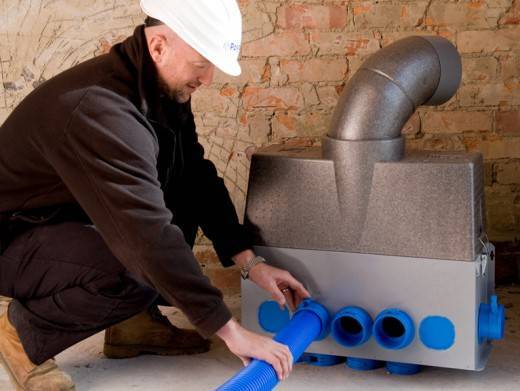Polypipe Ventilation's Installer Training Course Accepted for Competent Person Schemes
Tuesday 14th May 2013

Polypipe Ventilation’s independently accredited training programme for Domestic Ventilation Installers has been recognised by Competent Person Schemes, who are eager to provide domestic ventilation installation services under the latest revision of the Building Regulations.
Due to widespread poor installation practice found in Mechanical Ventilation with Heat Recovery (MVHR) and Mechanical Extract Ventilation (MEV) systems, which affect system efficiency – most notably the Specific Fan Power (SFP) – heavy penalties are applied to SAP calculations, the official method used to calculate the energy consumption in dwellings.
Recently however, the Department of Energy & Climate Change (DECC) stated that it will reduce these penalties if the systems are installed by a member of a registered Competent Person Scheme. In order to realise these new SAP Calculation benefits, a trained contractor registered under a Competent Person Scheme must be used to install MVHR and MEV systems. The installation must meet the performance laid out in the original system design and an inspection checklist must be completed and submitted to building control. A check box in the SAP 2009 programme needs to be completed to enable improvement to the overall energy rating.
In 2010, Polypipe Ventilation produced an in-depth Ventilation Installer training programme to meet the new requirements of Building Regulations Part F, Ventilation, which for the first time required a ‘qualified’ installer to commission new ventilation systems and submit a commissioning report to the Building Control Body (BCB). This two day training course was adopted by BPEC, one of the UK’s leading training providers, and is now widely recognised by the domestic ventilation industry. This same training scheme has also now been recognised by the Government as a suitable academic qualification for relevant Competent Person Schemes.
The scheme combines theoretical training and practical exercises to provide installers with the information and skills to install any of the common types of domestic ventilation systems in the UK safely and efficiently. The course also covers the inspection, test and commissioning of these systems as well as the provision of client operation and maintenance information. At the end of the course there is a theoretical and practical assessment which each candidate must pass.
The training manual accompanying the scheme has recently undergone a complete revision to further improve the level of training, with expert input from across the whole of the domestic ventilation industry. These amendments have been prompted by the publication of an in depth report on MVHR by the Zero Carbon Hub (ZCH) and NHBC task group that supports the Government’s view on the generally poor quality of MVHR installations to date. The report recommends a definite need for suitably trained installers and cites the BPEC scheme as an example. Also, the addition of an installed power test to the Domestic Ventilation Compliance Guide inspection checklist has been reviewed and incorporated into the manual.
Original author of the training scheme, Polypipe Ventilation’s Technical Manager, Jon Hill, comments on these latest developments: “Polypipe is at the forefront in delivering energy-efficient ventilation solutions and has been a driving force for change in the industry. In conjunction with BEAMA [British Electrotechnical and Allied Manufacturers Association] we have pushed hard for domestic ventilation installation to gain official recognition. We welcome these latest initiatives and see it as a positive step not only for house builders who can improve their properties’ DER (Dwelling Carbon Dioxide Emission Rate), but also for the domestic ventilation industry at large.”
For further information on Polypipe Ventilation’s Ventilation Installer training scheme, please call on 08443 715523. Delegates will be expected to have a background in plumbing, heating or electrical engineering, either with a number of years’ experience, or with (or working towards) a formal qualification at NVQ Level 3 in these subject matters.


